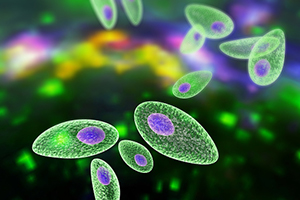A new study published by Hodge et al in the International Journal of Cancer suggests a link between Toxoplasma gondii infection and the risk of glioma in adults. The report found that people who have glioma are more likely to have antibodies to T gondii than a similar group that was cancer-free. These results suggest that reducing exposure to this common food-borne pathogen could provide a modifiable risk factor for highly aggressive brain tumors in adults.
Although glioma is a relatively rare disease, it is a highly fatal cancer. Globally in 2018, there were an estimated 300,000 incident cases and 241,000 deaths due to brain and other nervous system cancers. The majority—80%—of malignant brain tumors are gliomas, for which the estimated 5-year relative survival rate is 5%.
T gondii is a common parasite that is most commonly acquired from undercooked meat and may lead to the formation of cysts in the brain.

Photo credit: Getty
Association Discovered
For the study, investigators examined the association between T gondii antibodies measured several years before cancer was diagnosed and the risk of developing a glioma. Study participants were from the American Cancer Society’s Cancer Prevention Study-II (CPS-II) Nutrition Cohort and the Norwegian Cancer Registry’s Janus Serum Bank (Janus).
The study noted an association between T gondii antibodies and glioma was similar in two demographically different groups of people: patients in CPS-II were approximately 70 years old at the time of blood draw, while those in the Janus cohort were approximately 40 years old.
In both cohorts, a suggestive increase in glioma risk was observed among those infected with T gondii (odds ratio [OR] = 2.70, 95% confidence interval [CI] = 0.96–7.62 for CPSII‐NC; OR = 1.32, 95% CI = 0.85–2.07 for Janus), particularly among participants with high antibody titers specific to the sag‐1 antigen.
“This does not mean that T gondii definitely causes glioma in all situations. Some people with glioma have no T gondii antibodies, and vice versa,” noted study author James Hodge, JD, MPH.
“The findings do suggest that individuals with higher exposure to the T gondii parasite are more likely to go on to develop glioma,” said another study author, Anna Coghill, PhD. “However, it should be noted that the absolute risk of being diagnosed with a glioma remains low, and these findings need to be replicated in a larger and more diverse group of individuals.”
The authors noted that, “If future studies do replicate these findings, ongoing efforts to reduce exposure to this common pathogen would offer the first tangible opportunity for prevention of this highly aggressive brain tumor.”
Disclosure: For full disclosures of the study authors, visit onlinelibrary.wiley.com.

